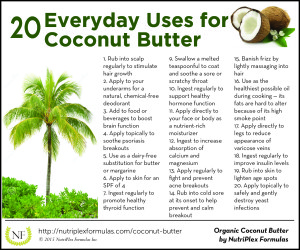Take a quick inventory of all the products that line the walls of your shower and the shelves of your medicine cabinet. It may shock you to learn that half of them could easily be replaced by just one product that’s most often stored in the kitchen  cupboard: unrefined coconut butter.
cupboard: unrefined coconut butter.
Most frequently recognized as a tasty, vegan alternative to butter and shortening, unrefined coconut butter is so much more than just its rich taste.
Packed with vitamins and essential fatty acids, this oil is regarded as one of the best fats known to human biology.
Used topically or internally, unrefined coconut butter is somewhat of a wonder substance, used to address an exhaustive list of ailments – from dry skin to Alzheimer’s Disease.
In 1958, Ancel Keyes, an American scientist, set out to prove that dietary fat – especially saturated fat – was the root cause of heart disease. In his study, he only used data from countries supporting his theory, ignoring data from countries such as Holland and Norway, where the average diets included a large amount of fat and a very small percentage of their populations suffered from heart disease. Despite massive criticism from respected scientists and the American Medical Association, the idea was picked up by senator George McGovern in 1977, and then the USDA.
From then on, good fat or bad fat, it didn’t matter – the American population falsely identified fat as something to stay away from entirely.
Though it’s been proven many times over that there is no link between saturated fat and heart disease, many Americans still have a hard time accepting that there are good fats, and that those fats – including those that are saturated – are actually vital to wellness.
However, good, unadulterated fats provide certain essential fatty acids that the body requires for proper function but is incapable of producing on its own.
Unrefined coconut butter, in particular, offers the body a unique combination of fatty acids – medium-chain triglycerides, lauric acid, and capric acid – that have been highly regarded for their immune-boosting, metabolism-stimulating, hormone-regulating, cognitive-enhancing, skin-repairing, and cardiovascular-promoting properties.
Indeed, populations whose diets consist primarily of coconuts have a nearly non-existent rate of cardiovascular disease.
Perhaps that’s because unrefined coconut butter has been proven to significantly reduce Total and LDL (or “bad”) cholesterol, and increase HDL (or “good”) cholesterol when ingested.
Unrefined coconut butter has also been studied for its amazing effects on such conditions as Alzheimer’s Disease, obesity, and epilepsy when regularly ingested.
Cosmetically, unrefined coconut butter is unrivaled as an “all-in-one” product.
Because it’s naturally antibacterial, antimicrobial, and anti-fungal, and is so rich in vitamin E (the hydrating vitamin), coconut butter is ideal for just about every skin type, ready to take the place of cleansers, moisturizers, anti-aging products, make-up removers, shaving creams, and massage oils.
Coconut butter is also lauded for its haircare applications and serves effectively as a deep conditioner, hair gloss, and frizz-reducer.
And, due to its lipophilic nature, the vitamin E contained within unrefined coconut butter is able to penetrate all underlying layers of skin and the hair shaft, delivering the potent nutrients coconut butter offers to where they’re most needed.
Ingested or applied topically, coconut butter should be used only in its organic, unrefined state. Coconut butter that has been refined is no longer health-promoting, and can actually have adverse health effects, as fats with altered compositions are no longer helpful to the body. And, if it’s not organic, you’re just smearing chemicals all over yourself, which is no better than coating your face with chemical-laden toiletries.

